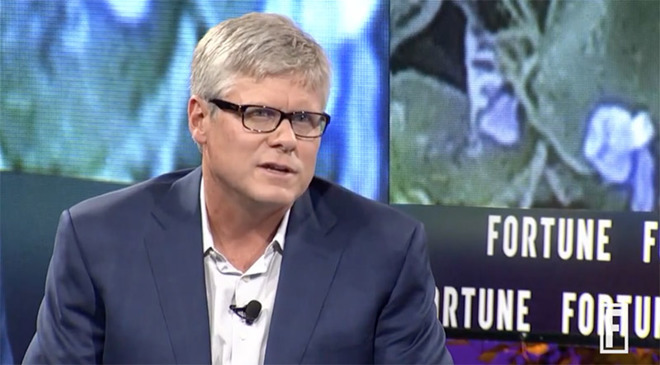Qualcomm CEO reiterates Apple feud comes down to IP pricing
Qualcomm CEO Steve Mollenkopf speaks at the Brainstorm Tech conference in Aspen, Colo. | Source: Fortune

In an interview on Tuesday, Qualcomm CEO Steve Mollenkopf commented on the chipmaker's fierce legal feud with Apple, saying that what appears to be an ever escalating international scrum is, at its core, about IP pricing.
Speaking onstage at the Wall Street Journal's D.Live tech conference on Tuesday, Mollenkopf said negotiations over patent licensing fees are at the heart of the matter, reports Fast Company.
"At the end, the important thing to remember is this is fundamentally a discussion about pricing over the fundamental technology that makes the phone the phone," Mollenkopf said. "It comes down to, 'How much are you going to pay?'"
He went on to point out that Qualcomm has "a long history of providing value and settling these issues," suggesting Apple, too, will settle out of court. Certain legal fights get more publicity than others, Mollenkopf added, noting the tussle with Apple is one of those cases, according to CNET.
"I think we'll get through it, we have a very strong product relationship with [Apple]," Mollenkopf said. "We sometimes have these disputes, but you have a broad relationship."
Mollenkopf's statements echo comments made in July. Speaking with Fortune at the Brainstorm Tech conference, the executive said IP pricing is at the core of Qualcomm's dispute with Apple. More specifically, the argument comes down to what companies want to pay for Qualcomm technology, assets Mollenkopf believes kickstarted the smartphone industry.
"But in reality, if you strip it all away, it's really about — we have a contract and people want to pay less under the contract and there's a lot of worldwide maneuvering to try to get that resolved," he said at the time.
In the July interview, Mollenkopf said he expects Apple to settle out of court.
Mollenkopf's most recent comments come just days after Qualcomm filed a series of lawsuits in China looking to block the sale and production of iPhones in the country. If successful, the legal gambit would deal a devastating blow to Apple, whose revenues are intrinsically tied to Chinese suppliers and, to a lesser extent, regional retail sales.
Qualcomm is also seeking to block import and sale of iPhone and iPad models in the U.S. through a separate International Trade Commission complaint.
Apple initiated the legal wrangling with a lawsuit in January that claimed Qualcomm abused its "monopoly power" over the wireless modem industry to demand excessive royalties. Qualcomm's royalty rates are calculated based on whole device value, not per-component. That suit further claims Qualcomm withheld almost $1 billion in promised rebates as retribution for Apple's participation in a South Korean antitrust investigation.
Apple later filed two lawsuits in China over similar allegations.
Qualcomm counter-sued in April and has since asked courts to force Apple contract suppliers who stopped paying royalties earlier this year to continue payments. In August, Qualcomm revealed the Apple case has cause the company to shed 20 percent of its market value
Apple has licensed Qualcomm IP for years as it built the company's modems into iPhone and iPad devices. The Cupertino, Calif., tech giant began to diversify with iPhone 7 by sourcing modems from Intel, a strategy that continues with iPhone 8 and iPhone X.
Tangentially related to Apple's case are ongoing investigations into Qualcomm's monopolistic practices. Along with the 2016 South Korean ruling, Qualcomm was most recently slapped with a $773 million fine by the Taiwanese Fair Trade Commission.
 Mikey Campbell
Mikey Campbell










 Mike Wuerthele
Mike Wuerthele

 Malcolm Owen
Malcolm Owen
 Chip Loder
Chip Loder

 William Gallagher
William Gallagher
 Christine McKee
Christine McKee
 Michael Stroup
Michael Stroup






